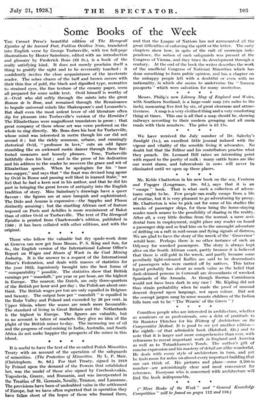Mr. Keble Chatterton in his new book on the sea,
Ventures and Voyages (Longmans, 10s. 0d.), says that it is an " escape " book. That is what such a collection of adven- tures ought to be. Few people can really escape from a life of routine, but it is very pleasant to go adventuring by proxy. Mr. Chatterton is wise to pick out for some of his studies the wrecks of passenger ships, for these bring the home-staying reader much nearer to the possibility of sharing in the reality. After all, a very little decline from the normal, a mere acci- dental turn in employment, might place any reader on board a passenger ship and so lead him on to the unsought adventure of drifting on a raft in mid-ocean and flying signals of distress. We are glad to have the story of the wreck of the Grosvenor' retold here. Perhaps there is no other instance of such an Odyssey for wrecked passengers. The story is always kept alive on the South African coast, partly because it is believed that there is still gold in the wreck, and partly because some peculiarly light-coloured Kaffirs arc said to be descendants of passengers who were carried off by natives. This latter legend probably has about as much value as the belief that dark-skinned persons in Cornwall are descendants of wrecked Spaniards of the Armada. As though Iberian Cornishmen would not have been dark in any case ! Mr. Kipling did not thus strain probability when he made the proof of unusual descent depend upon language, not upon colour. Did not the corrupt jargon sung by some remote children of the Indian hills turn out to be " The Wearin' of the Green " ?
• * *




















































 Previous page
Previous page